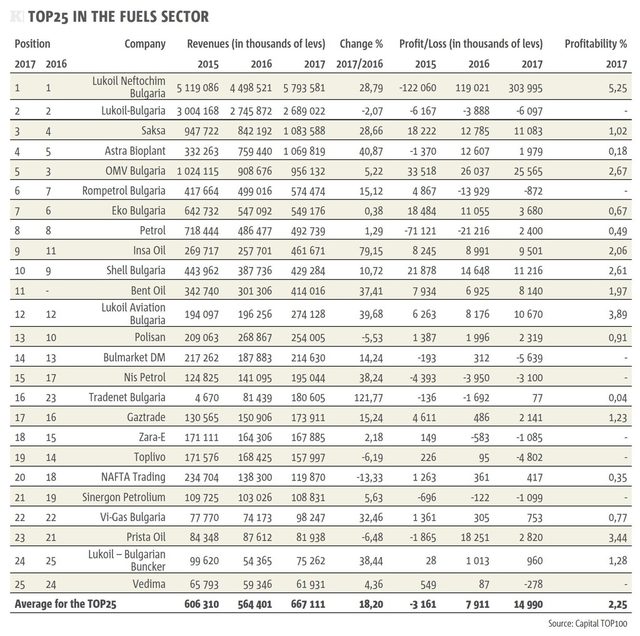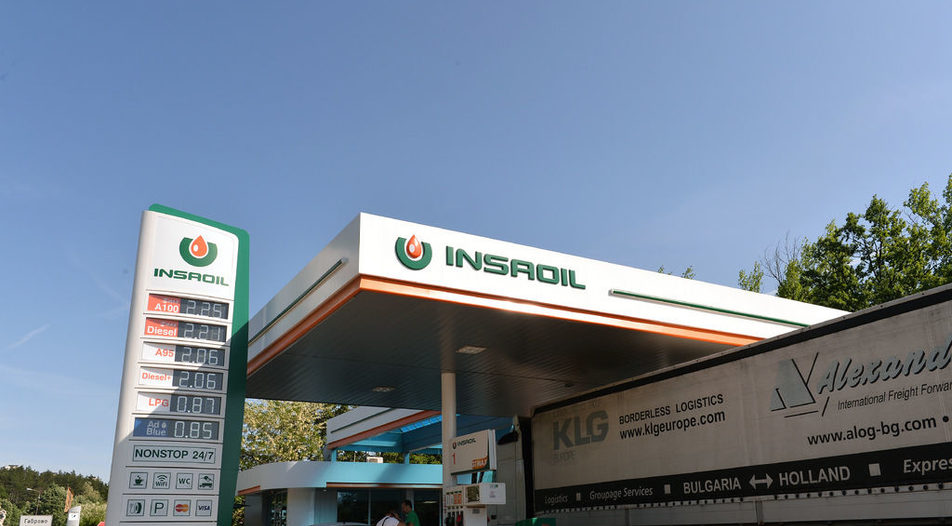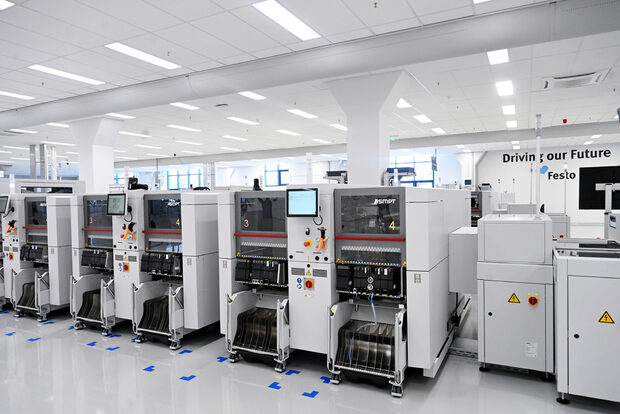• No major deals in 2017, fresh developments likely in 2018
The year 2017 marked stabilization of the companies operating on the Bulgarian fuel market. The total revenue of the largest companies in the sector grew by 2.5 billion levs compared with 2016, an average 18% increase for the 25 largest in the sector.
The bigger turnover logically came from the surge in global oil prices but the sales volumes also increased, albeit slightly. Some 3 to 4 percentage points out of the 18% growth rate can be attributed to the rise in sales, according to market sources.
The regulatory environment was also stable during 2017. After the early parliamentary elections in March, the big fuel retailers avoided paying heavy fines for suspected fixing of prices. The Commission for Protection of Competition, despite its initial conviction, did not find a cartel on the market and abuse of dominant position by the biggest player in the course of its probe. In the early stage of the investigation, in June 2016, Lukoil president Vagit Alekperov even talked about sale of the Russian group's assets in Bulgaria but this is not the case anymore. The accusations of foul play traded between the president of Lukoil Bulgaria Valentin Zlatev and the new player on the market, Veselin Mareshki, also subsided after the elections.
Judging from the figures, there were no major changes in the performance of the fuel retailers last year, sharp declines and rises occured among distributors, importers and producers whose names are not that popular among the general public.
Tensions on the fuel market, however, escalated in the spring of this year. The big companies, members of the Bulgarian Petroleum and Gas Association, resumed with fresh strength their old initiative to write a new bill on fuel trade setting needlessly expensive regulatory requirements for smaller companies. Despite the serious discontent of smaller market players, transport companies and farmers, as well as negative opinions of several ministries, the new sectoral regulation is expected to be adopted by the parliament - with some amendments seeking to soothe discontent.
A collision between two of the main market players - Lukoil Bulgaria and Insa Oil, occurred this spring, the result of which will most likely show in the 2018 annual reports of the two companies. Also, the licenses of the big fuel wholesaler Polysan, were revoked this spring.
Looking ahead, the market is awaiting the privatization of the assets of one of the biggest players in the region, Greece's Hellenic Petroleum, which is present in the country through fuel retailer Eko Bulgaria. Greece has already received letters of interest from five candidates for the acquisition of a majority stake in Hellenic Petroleum.
The Big Winner
Unsurprisingly, the ranking of the biggest fuel companies is led once again by the largest revenue-generating enterprise in the country - the Lukoil Neftochim Burgas refinery with revenue of almost 5.8 billion levs. Notable is the company's 2017 profit of nearly 304 million levs, ranking it first in terms of profitability in the sector. The official explanation issued in 2017, when for the first time in years the refinery was not in the red, was that production had become more efficient because of new investments aimed to increase the output of light fuels (gasoline and diesel) without increasing the input of raw materials.
The second most profitable company is also member of the Russian group - Lukoil Aviation Bulgaria, which is the division dealing in aviation fuel supply. One explanation is that the number of flights to and from Bulgaria grew last year as low-cost carriers added new routes and frequencies. Another explanation is the reduced participation of other players in this segment like OMV Bulgaria, according to sources from the sector. A third member of the group - Lukoil Bulgaria Bunker, which provides a full range of bunker fuels, grew its revenue above the market average.
Surprisingly, the leader in wholesale and retail fuel trade - Lukoil Bulgaria, recorded a slight drop in revenue and higher losses amidst rising fuel prices. In its 2017 annual report the company explained this with "a number of macroeconomic factors and the changed market situation". Revenues from core business decreased by 3%, with the report attributing the fall to unfavorable lev/dollar exchange rate and international oil prices. Due to the bigger financial revenue, however, the drop in overall revenue amounts to 2%. A breakdown by sectors of activity shows that the drop is in wholesale - by 6% to 1.9 billion levs, while in retail where the company operates through 222 gas stations, growth is reported. One more time the company posted annual loss last year. Since only Lukoil Bulgaria is supplied by the associated refinery, there are doubts in the sector that a choice has been made as to which company in the group to assign the profit.
122% Mareshki
Last year was very successful for Vesselin Mareshki, a competitor to Valentin Zlatev. On the one hand, Mr. Mareshki entered parliament as leader of populist Volya party, on the other, he built a network of gas stations, VM Petroleum, which achieved an enviable turnover considering its size. His network reported the highest growth rate in the fuel sector with a 122% surge in revenue - from 81 million levs levs in 2016 to 180 million levs last year, ranking it 16th in the sector. The number of his gas stations is 16, too.
According to competitors, Mr. Mareshki owes his success to the fact that he managed to position his business where no one had been previously - in the lower price segment. This strategy can only be successful if the company sells huge quantities. Market players predict that this year will be just as successful for him, as with fuel prices rising the discounts at his gas stations will lure more customers.
However, the company said to be the fuel supplier of Mr. Mareshki's network - Polysan, is less successful. The Customs Agency terminated its licenses for tax warehouse operations in Ruse Free Zone this spring over violation of the procedures for the supply of heating oil which was levied a lower-than-prescribed excise duty. Polysan, founded by local businessman Hristo Valkov in 1994, is specialized in the production of bitumen and boiler fuels.
Life outside the association
Second-ranked after Mr. Mareshki's network in terms of revenue growth in 2017 is Insa Oil with 79% gain. Another success of its owner, Georgi Samuilov, is the providing of financing for the purchase of Municipal Bank. The company acquired non-voting shares in the bank at the beginning of this year, thus providing the needed 46 million levs to the buyer of the controlling stake of 67.65% Novito Opportunities Fund, created by Liechtenstein-based CAIAC Fund Management.
Several months later Mr. Samuilov announced that his company was leaving the Bulgarian Petroleum and Gas Association. His official motive circulated through certain media was his disapproval of the new sectoral draft bill, which in his words would benefit the largest player on the market, i.e. Lukoil Bulgaria.
Market sources, however, believe that the reason lies in the new distribution policy of Lukoil Bulgaria. According to those sources, Lukoil Bulgaria changed its delivery policy at the end of last year and early this year, reducing the large number of companies with direct contracts for wholesale purchase from Lukoil Bulgaria to four and setting higher requirements for the minimum monthly number of orders. Initially, the four companies were Litex, Bent Oil, Saksa, and Insa Oil. One of the hypotheses has it that Insa Oil had not met the new requirements for orders and quantities but rather continued to import fuels, and therefore had its contract terminated by Lukoil Bulgaria.
Increasingly larger
Fuel distributor Saksa comes for the first time among the top three in the sector. The company has an oil terminal in the town of Novi Iskar and is one of the biggest importers and exclusive distributors of the fuels of the Burgas-based refinery. It entered the business in 1993; partners in it are the Dimov brothers Svetozar and Krum and their father Atanas Dimov. The company also is active in fuel retail with its filling stations under the Cruise brand. The company reported year-on-year growth in all segments in 2017, the number of its stations has increased to 26 at present. Saksa has supplied fuel to the participants in some of NATO's military exercises in Bulgaria and Romania.
The biodiesel refinery Astra Bioplant, based in the village of Slivo Pole near the city of Ruse, is very close to the top three with its strong 40.8% revenue growth; in 2015 it was 10th in the ranking. The factory, with over 1.0 billion levs in revenue in 2017, manufactures industrial oils and biodiesel. It is indirectly connected with Bulmarket DM - a propane-butane trader, which offers transport services and is the first private railway undertaking in Bulgaria.
Astra Bioplant has two production plants. The first one, with capacity of 60,000 tons per year, was built from scratch in Bulgaria and has been operating since 2009 in Ruse. The second plant, with annual output capacity of 110,000 tons was relocated from Enns, Austria and positioned alongside the first unit in Slivo Pole.
The story of the second plant began in 2007 in Austria where it produced biodiesel for the needs of energy solutions company GATE. After operating for half an year, the plant shut down because of financial problems and was bought by Bulmarket DM in 2010. The operation of the plant in Enns was considered ineffective in terms of raw materials supply, markets and production costs, and a decision was made to move it to Bulgaria. The relocation was completed in 2015 and the plant operated at full capacity in 2016, as part of Astra Bioplant. This is reflected in the company's revenues. Astra Bioplant exports 70%-80% of its output and is also a main biofuel supplier to the Lukoil Neftochim Burgas refinery. The company plans a further 40% expansion of production capacity in Slivo Pole - a 6.0 million levs investment project which is currently in its design phase.
Filling stations
Among the big networks of filling stations operating in Bulgaria, only NIS Petrol, the local subsidiary of Serbia's NIS controlled by Russia's Gazprom Neft, grew its revenue ahead of the market last year. Gazprom Neft entered the region in 2009 when it bought a majority stake in Serbia's state-owned energy group Naftna Industrija Srbije (NIS) and invested in NIS' Panchevo oil refinery. Initially, NIS Petrol had ambitions to open 70 gas stations but their number remains 35 and the company has said that it has no specific plans for new sites. Its revenue growth of 38% comes mainly from wholesale but the company also relies on promotions and loyalty programs in its retail operations.
The remaining networks of gas stations display revenue growth rates close to rate of increase of fuel prices (Rompetrol Bulgaria and Shell Bulgaria), or lower. OMV Bulgaria grew its revenue by just 5% in 2017 but its profit remained almost flat compared to the prior year. Petrol's revenue rose by a mere 1.0% but the company swung to profit in 2017.
On the propane-butane market V-Gas Bulgaria reported growth above the average in 2017. The company started in 1998 as Shell Gas Bulgaria, changed its name to Vitogaz in 2007, and in 2013 was renamed to V-Gas.
Awaiting news from Greece
In 2017, Eko Bulgaria reported nearly the same volume of revenue as in the previous year, but its profit shrank sharply. One explanation for the slump in profit is that in the autumn of last year Eko Bulgaria, a member of Greece's Hellenic Petroleum Group, acquired 12 gas stations which it rented previously. The seller was Bulgaria Leasing. The 12 petrol stations have been operating under the Eko brand since 2006, when a long-term lease contract was signed with their previous owner, Eko Petroleum (not related to the Greek group). One of the big news for the sector is expected to come along the Greek line following announcement by Greece's privatization agency HRADF that five potential investors have expressed interest in acquiring a majority stake in Hellenic Petroleum. Potential buyers of 50.1% of the shares include Glencore Energy UK, Vitol Holding, Alrai Group Holdings, Gupta Family Group and consortium consisting of Carbon Asset Management DWC and Alshaheen Group.

• No major deals in 2017, fresh developments likely in 2018












